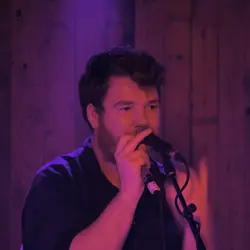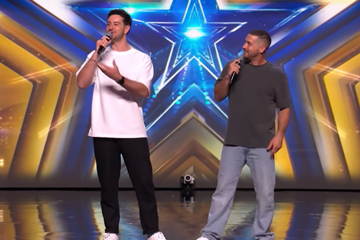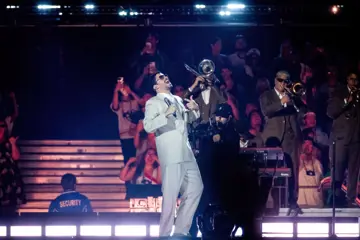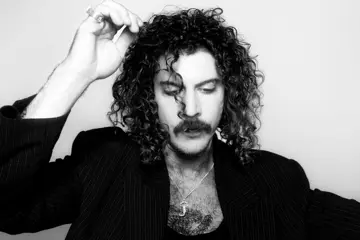 Chad Valley
Chad ValleyChad Valley sounds like the name of the jerk with the girl in an '80s T&A teen-movie; probably the rich son of the local developer who wants to tear down the beloved ______, who'll be inevitably be humiliated by the nerds and lose his girl to our hero. It's also the name of the solo guise for Hugo Manuel, the leader of Oxford-based pop band Jonquil (who started out closer to droney folk, and now make synth-pop with stadium new-wave overtones). It's also the name of an actual valley in England, and a budget-toy company... but let's stick with the Manuel angle: does he pop the collar on his polo shirt and polish his boat-shoes to get into character?
“I like the fact that people think it's a name; that it's my name,” smiles Manuel. “I like it when I turn up to a venue for a gig, and the sound person says 'hey, Chad, nice to meet you!'; I just go along with it. It's like having a double persona. It sounds really American, to me, and I've always been into Americanisms.”
Whilst Manuel talks of his love of American music —and, as pals with Twin Shadow, Active Child, How To Dress Well, et al, his own music probably makes more sense when removed from its homeland— in truth Chad Valley sounds more Swedish than anything else. His record label for North America, Cascine, has had a long relationship with dreamy, Balearic, ambient Swedes, and Manuel himself confesses his debt to various downbeat disco dons from on Scandinavian shores. “I was influenced by a lot of music that was, for want of a better word, very tropical, or exploring the elements of world music,” he offers, when talking of Chad Valley's early days. “A lot of Swedish stuff: the Tough Alliance, Studio, Korallreven, Air France; all that Gothenburg stuff that was coming out thick-and-fast at the time.”
When Manuel began recording as Chad Valley, early in 2010, he did so with entirely careerist ambitions. By that point, Jonquil had turned out a run of records —two LPs, 2006's Sunny Casinos and 2007's Lions, followed by two EPs, 2009's Whistle Low and 2010's One Hundred Suns— but Manuel found himself still stuck working a dayjob he wanted to get out of. “I was doing 9-5s, then coming home and writing stuff, and three evenings a week we'd have Jonquil band practice,” he recounts. “So, I'd had enough of that; and I came up with a name, and made a MySpace, and put the four songs that I had up on MySpace, just for the sake of getting gigs. I realised playing gigs by yourself you get to keep all the money. So, in those early days, getting 50 quid, 100 quid for a show, that'd mean I'd get to work less at my job. That was a huge motivation at the start of it: being able to almost call myself a professional musician. That gave me the impetus to really pursue this project as much as the band."
Don't miss a beat with our FREE daily newsletter
His first four songs became the basis for his debut, self-titled Chad Valley EP in 2010, which was followed in 2011 by the 'mini-album' Equatorial Ultravox. Each was a work of dreamy, washed-out synth-pop and keening falsetto; and, after two records of the same, Manuel sought to change things up with his debut LP proper. Thus comes Young Hunger, the product of Manuel's synthesiser nerdiness and love of glossy '80s pop. “I set out to make something very different from what I'd already done,” he explains. “I wanted to contradict myself a little bit. Everything I'd done had been hazy, recorded onto tape, a bit distorted. I wanted to make something contrasty, glossy, and slick."
The album is notable for its litany of guest-vocalists, Manuel duetting with the likes of Twin Shadow, Active Child, Glasser, El Perro Del Mar, and Totally Enormous Extinct Dinosaurs. “It's hard, as a solo musician, to not get really introspective,” Manuel explains, of the cavalcade of celebrity special guests. “I'd done two EPs worth of introspection; songs that were just me and my thoughts, written and produced by me with lyrics by me. It was all a little too me-centric, and I'm not too comfortable with that. So, I wanted to have other voices in there to widen the palette.”
The album highlight is the steamy slow-jam with El Perro Del Mar, Evening Surrender, one of Manuel's saddest ever songs (“when I sit down at the piano, it'll always be in major keys,” he says, “writing sad songs doesn't come naturally to me; I guess I'm just a happy guy!”), melancholy dowsed in smouldering Quiet Storm seduction. “I'd got really obsessed with New Edition, the R&B group from the '80s,” Manuel says. “They were like the original boy-band, produced by Jam & Lewis, a real New Jack Swing kind of thing. So I just wanted to, somehow, incorporate elements of that. It's such a specific sound, that uses such specific instruments; and being the synth geek that I am, I could spot most of the instruments that they used. I even had a lot of them, all these forgotten late-'80s synths that people don't want because they're not fat and analog, they're crispy and digital. But I love that.
“So, I wrote a whole bunch of tunes in that kind of vein, and Evening Surrender was the result of that. I definitely wanted a girl on that, and I didn't know anyone who could do it justice; I wanted a really fragile voice on there. Someone at my label suggested El Perro del Mar because they knew her manager, and I jumped on it: 'this has to happen! Let's definitely make it happen!' I don't think anyone realised how much of a fan of hers I was. And, lo and behold, she was up for it. She was in the middle of making her album, Pale Fire, that's just come out; we were both in the middle of making our albums so it took a while for it to get recorded. She just did it herself and sent it over to me. I've still not even met her. Quite weirdly. It was a completely remote and surreal duet.”















